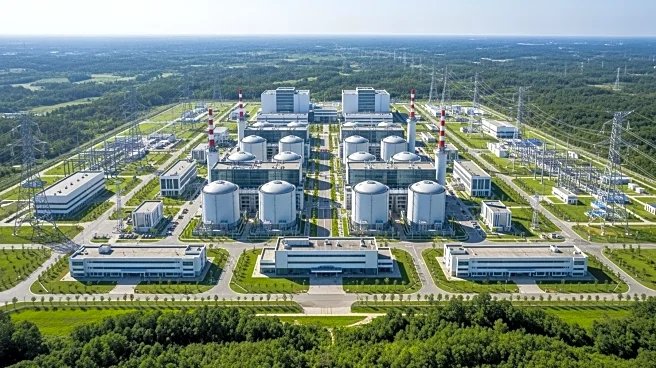What's Happening?
Amazon has announced plans to fund the deployment of 12 small modular reactors (SMRs) at the Cascade Advanced Energy Facility in Washington. This initiative is part of a strategic collaboration with X-energy, Korea Hydro & Nuclear Power, and Doosan Enerbility,
aimed at accelerating the deployment of Xe-100 advanced nuclear reactors in the United States. The Cascade facility, to be built by Energy Northwest, will initially develop four SMRs with a capacity of 320 MW, expandable to 960 MW. The SMRs will be supplied by X-energy, which received $500 million in Series C funding from Amazon last year. The facility is expected to start construction at the end of the decade, with operations targeted for the 2030s. This project is designed to meet increasing power demands from data centers, advanced manufacturing, and electrification, providing reliable, carbon-free, and sustainable energy generation.
Why It's Important?
The deployment of SMRs at the Cascade facility represents a significant advancement in nuclear energy technology, offering a modular and scalable solution to meet growing energy demands. This initiative is crucial for supporting the expansion of data centers and advanced manufacturing, which require substantial and reliable power sources. By investing in nuclear energy, Amazon and its partners are contributing to the reduction of carbon emissions and promoting sustainable energy practices. The collaboration aims to mobilize up to $50 billion in public and private investments, potentially transforming the U.S. energy landscape and reinforcing American energy dominance. This project also highlights the role of nuclear energy in supporting the growth of artificial intelligence and digital tools, which are increasingly integral to modern industries.
What's Next?
Construction of the Cascade facility is expected to begin at the end of the decade, with operations slated for the 2030s. As the project progresses, stakeholders including Amazon, X-energy, and their Korean partners will likely continue to explore additional opportunities for deploying nuclear energy both domestically and globally. The success of this initiative could pave the way for further investments in nuclear technology, potentially influencing energy policy and encouraging other companies to adopt similar sustainable practices. The collaboration may also lead to advancements in supply chain capacity, supporting the future growth of nuclear energy and artificial intelligence.
Beyond the Headlines
The deployment of SMRs at the Cascade facility could have broader implications for the nuclear energy industry, potentially setting a precedent for future projects. The modular nature of SMRs allows for more flexible and efficient energy production, which could lead to increased adoption of nuclear technology in regions with limited space or infrastructure. Additionally, the collaboration between U.S. and Korean companies underscores the importance of international partnerships in advancing energy technology. This project may also stimulate discussions on the ethical and environmental considerations of nuclear energy, as stakeholders balance the benefits of carbon-free power with concerns about nuclear waste and safety.
















